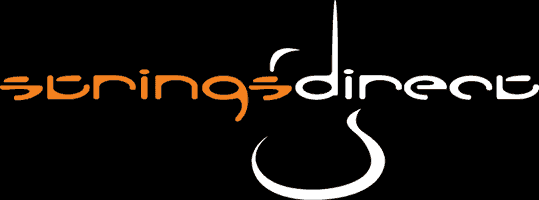STEVE VAI
By Strings Direct – 29 August, 2023
PLAYER SPOTLIGHT

“While many musicians fit easily into a single category, Steve Vai’s unique musical vision remains unclassifiable. After more than 30 years, Vai continues to use unbridled guitar virtuosity and soulful artistry to explore the spectrum of human emotion.”
- Vai.com

New York, New York, New Wave, New Age, a land of remarkable achievements and unlimited opportunity. A fitting location for this weeks spotlight; we look to uncover, discover, and unravel a mysterious wizard of the 6-string. A player so far into other worldly expression and technical progression that you might be right in thinking his abilities are actually out of this world 🌎! You’d be forgiven for perceiving this extraordinary character as an entity from outta space 🌝 when you experience his playing.
Welcome to the world of Steve Vai aka U.G.M
(Unexplainable Guitar Master)
“I saw myself playing the guitar, but I handled it in ways that made totally abnormal sounds. I would touch it a certain way, and it would make a squeak, or I'd scream into it. There were no barriers--even my movements were beyond gracefulness.... That event was the beginning of my realization that I had an identity on the instrument, and it was the single most important event in my musical career.... It's where I got most of my musicality from, I believe, or at least that's how I discovered it.”
Steve Vai for Joe Gore @ Guitar Magazine
Vai-ography … 🎶 🎼 🎵
The beginnings of any journey are fascinating and the timeline of Mr Steve Vai is no exception.
Born in June 1960 a descendant of Italian immigrants, in Carle Place, New York Steve Vai is the fourth son of John and Theresa Vai.
His father was a liquor salesman so Steve didn’t hail from a predominantly musical upbringing and background. As he recalls, he really had to put the work in… dedication and full scale commitment will eventually prove its merits.
“I didn’t know anything. I mean, I was noodling around with a guitar in my bedroom before that, but I didn’t know what I was doing,” Vai said. “I was just playing by ear and I didn’t know how to keep the strings tuned.”
Steve Vai - By Daniel Seah - guitar.com
Every musician's initial significant moment of connection is always memorable, and Vai is no different. He reflects vividly on his key moments that would go onto shape his entire life …
“I was very young when I first kind of woke up to music. I think I was like four or five. I remember I walked up to a piano and I hit a note and music just became clear to me, you know, the process of creating music. When I was about seven or eight I think, I saw a young boy playing the guitar in my school and I walked into the auditorium and he was like nine or 10, when you're seven or eight, somebody that's nine or 10 is like a God, especially if they have a guitar. That was a very powerful moment. It was like a moment of clarity because I just saw it and I just, everything kind of went away. I just saw this guitar hanging off of this young kid and immediately fell in love with it. I just instinctively understood what it was. It was like it was always there, but I didn't find it until then. And as soon as I saw the instrument, there was an immediate connection.”
Steve Vai - Ernie Ball String Theory.
Here we uncover two very significant moments of musical awakening in Steve Vai’s life as a young man, the moment was monumentally defining, in his own words he expresses his the beginnings of his guitar playing timeline.

“When I was 12 my sister came home with Led Zeppelin II and the moment that I heard Heartbreaker, the fantasy of playing the guitar, it switched from wishing that I had a guitar to desiring to play one, to right at that moment when I heard that, the intention was solid and I said: "I'm going to play the guitar." And I had a friend that had a guitar that he never played and it was one of those Tesco Del Rey's, you know? And it was hanging on the wall in his bedroom and I bought it for five bucks and that was it. I mean, that guitar, I did everything with it. You know, they say, "Oh, I used to sleep with my guitar." Every night it was in the bed, but I'm not really natural at playing an instrument oddly enough. I had to work really hard at the guitar.”
Steve Vai - Ernie Ball String Theory.
There are many key details within the quote and some really awe-inspiring facts that outline how Vai began guitar, the truth and outline is right at the end “I had to work really hard at the guitar.”
This line is important to notice as this reflects heavily on the historic moment - Steve Vai was interviewed for Guitar World Magazine in 1990 and fully outlined his 10-hour+ practice regime!
This is now so iconic, significant and continually debated that it has gone down in guitar culture history.
“Vai sat down with guitarist/transcriber Dave Whitehill and outlined his practice routine for the January 1990 issue of GW. Never before had a guitarist given such an in-depth explanation of his musical exercise regimen.
It became a must-have for guitarists. Many of the players interviewed in GW have cited it as an influence on their development as guitarists. A chance to experience the workout in its original form and to learn some of the things Vai has done to develop his formidable chops and remarkable music vocabulary.”
GuitarWorld Magazine


We clearly recognise why Steve is not only considered an ultimate guitar God and icon and also a master of the art due to his invigorating practice routines, but he's also published with great credibility for this fine work and his accompanying print “VAIDEOLOGY”.
Steve Vai continues to convey his methods and regimes in regards to development, practice and ultimate dedication to one's craft.
During a recent online content publication known as "Alien Guitar Secrets" Vai invited us into a rabbit hole of almost religious forms of practice both practical and somewhat spiritual.
The following transcript is truly mind blowing and you may want to take a deep breath in any attempt to resolve this incredible perception on how to take things to the next level… 😉
When asked during a broadcast of Alien 👽 Guitar 🎸 Secrets:
“Best advice to make the most from our practice sessions?”
"That's a good one. You will always get the most out of your practicing when you're enjoying it. A lot of people believe that I have had to employ a tremendous amount of discipline in my life, to practice as much as I practiced when I was younger, and the way that I work sometimes. 'Oh, you're so disciplined.'
And that always felt kind of odd to me, and when I took a closer look at it, I realized I'm actually not very disciplined. [Laughs] I can only do what I really want to do - I surrender to my instincts whenever they're clear enough.
I put in all these hours practicing because it was my passion, it was a joy, so see if you can, in your mind and in your words, replace the word 'passion' with the word 'discipline.'
Because discipline has in it the feeling that you have to do something, you have to put forth energy, and you can almost fight, you need to fight to stick with it, and perhaps at times a little bit of that is helpful, but passion is very different.
When you're in a state of passion, there's no discipline necessary because everything is enjoyable. You don't want to stop and things start connecting. In the state of passion when you're creating, obstacles turn into opportunities.
There are no obstacles because you're so focused nothing is gonna stop you, that's what passion does. And as a matter of fact, and someone might say, 'What do you mean? You need to be disciplined, and if you're working, you can be in a state of passion, and the whole thing can go to hell because some of the components didn't come together.' I don't believe so.
When you're in that state, there's enthusiasm and there's joy, and there's clarity, and there's communicative abilities with co-creators around you, you're working with just the right people. When an obstacle or a 'problem' comes up, the state of passion looks at it and says, 'How can I use this to get to where I want to go?'
A state of discipline just fights it and fights it, and many times can be crippled by it. When you look at obstacles and you ask yourself - this is the key, you have to sincerely and authentically ask yourself, you can't give yourself lip service.
You have to really be sincere and say, 'Okay, this situation looks as though everything is going to hell in a handbag. This situation looks as though that person is blocking my ability to do what I need to do.'
So, in that situation, can you ask yourself, 'How can I use this to my benefit? How can I see this as an advantage somehow?'
Now, the moment you do that, you will see it because your whole perspective is changing, and it might be that you needed to go through this thing that failed in order to find the relationships or the inspiration or the co-creative elements to continue in a more powerful way towards your goal.
But you can see how that can easily be crippled and cut at the rood when a 'problem' arises; you just give up, that's it, and then in that kind of situation there's blame, and then you're off, you're gone, forget it, pack it in.
It's a shift, it's a shift in a perspective to ask yourself, 'How can I make lemonade out of lemons here?' But the moment you do that, your radar is looking for solutions, and you'll find them because they're there, so that's maybe a little helpful.
To make the most out of your practice session, play the things that you enjoy. Play the things that you chip away at to achieve a certain technique, but do only those things that you're drawn to.
It's funny, I made a quote in an interview once, and boy, did I have to answer for it - and what I said was, 'I don't really focus on my weaknesses. I ignore them and I focus on my strengths.' Well, what I mean by that is my strengths are the things that I find really appealing, the things that I find in myself that I really enjoy doing.
There's a path that I'm following with my creativity, there's these little treasures for me every time, and you know what that feels like, you've done that, and it's a lovely feeling, and when I'm uncovering these little treasures, I'm really enjoying it, and that's a strength.
Within my strength, there are weaknesses, and I work on those, but one might consider, 'Well, if you're a great guitar player, you need to know jazz, you need to know classical, you need to be a great blues player and all this stuff.'
Well, that would be my weakness, and I don't pay any attention to it because I like jazz and I like blues - authentic kinds of blues - and I like classical, I like chipping away a little bit of that stuff, but it's just not my calling in life.
And I'm not gonna make it my calling because it's more popular than what I'm doing. You got to find what's interesting to you and throw yourself into it without any excuses. It will make you very happy.
If you're doing that in your practice session, you're gonna put your head down, and you're gonna pick it up, and you're not even gonna realize how much time went by because you'll be in the state of enthusiasm and passion, and that's the 'now.'
There's no time in the 'now,' that's why it seems like when you're completely engaged in something that time passes like, 'Oh, what happened?', so this is a good thing, it's a great place to be. It's better than having a minute feel like an hour, that's discipline.”

Sharing a few more practice tips, Vai said:
"Now, another thing you can do on your downtime is - a lot of other musical things that can improve your playing don't even require you to touch the guitar. Here's a really good one that I still do this, I love doing this, I've done it for years. It's difficult, but it takes practice, and it takes real focus, but it's incredible:
When you go to sleep - when you're lying in bed, close your eyes, relax your body, and visualize, actually visualize yourself playing and listen audibly and visually and only 'play' what you're capable of hearing with your own ear with the fingers that are playing in your mind.
So, for instance - this sounds a little odd - okay, so if I'm laying in bed and I'm kind of imagining the guitar neck in my mind, and I'm hearing something like *plays*, so those notes that I just played, I could see my fingers doing that in my mind and I can hear it if I'm laying there at night and I'm sleeping. But for some people, they may not be able to actually see and hear that, so you got to start easy.
If you can connect in your mind seeing yourself play those notes and hearing the notes that are correct to come out, this is incredible practice because you're connecting with your inner ear, and you're strengthening it, you're strengthening it in your mind, which in some sense is not different than picking up the guitar and actually playing.
So, I'm just playing, but I'm following it in my mind, I can go *hums*, and I'm seeing it, and many of you already know simple, you know, your blues scale. By now you know what it's gonna sound like in your mind if you're looking at the neck."
Steve added:
"This creates an incredible connection between your inner ear and your instrument, and this will benefit you when you play exponentially. It takes discipline, you got to keep pulling your mind back to that visual, and then you can do all sorts of crazy things with yourself in your mind.
You could see yourself doing things that you wouldn't dream of doing live because you'd be afraid you don't fit in, but that's the laboratory of your own creative expression and it's your best friend because when you get comfortable in that zone of the freedom of expressing yourself, that's addictive.
It's incredibly rewarding, and it's very rewarding for those who resonate with it that are around you, so try that."
Steve Vai Transcript from “Alien Guitar Secrets” - Via ultimateguitar.com
“I NEVER FELT AS THOUGH I WAS GOING TO RUN OUT OF MENTORSHIP” -“There was always this greatness about Joe that always seemed to surprise and delight.”
Steve Vai on Joe Satriani
A further key detail of the development of the now truly out-of-this-world extravaganza known as Steve Vai was the fact that he began his early years playing the guitar with a guitar teacher local to the area, a teacher that came highly recommended through reputation of course: Mr Joe Satriani! 🤘
He began to take lessons with Joe at the age of 12 and continued to an almost religious level over the next 3-4 years.
Steve has described his time with Joe as something truly life changing. He recalls how one lesson developed into another organically, along with the continued amount of learning, a wealth of information and musical dexterity and depth that set open a world of discovery and development.
“An incredible teacher”

Viable Vai ⚡️ 🎵🎼 …

If you've ever been in a store with a lot of guitar magazines on display you'd be hard-pressed to not have seen Steve Vai’s image displayed on the front cover of them.
Extreme dedication discipline and pure determination to make dreams become realities has seen Vai become a phenomenal success. A three times Grammy award-winning musician, Steve not only has expertise in guitar but is also a visionary composer as well as an accomplished producer.
The foundations of his career within the music industry were incredibly iconic in their own right; at the age of 18 he was involved in the Frank Zappa entourage as a Transcriptionist, which came about after Vai had sent over a notated transcription of Frank Zappa's "The Black Page", and a recording of his college band, Morning Thunder.
Zappa was very much impressed by the content he had received and immediately took a young Steve under his wing.
After much experience, knowledge and wisdom gained the wizard moved on and developed a solo career along with a solo identity during the most turmoil transition period of his career. His first solo offering Flex-able became a critically acclaimed success the paved the way for the man we know today.
Another landmark career moment to note would be when Vai joined Billy Sheehan and David Lee Roth’s band 'Eat’em and Smile'. The album and tour saw some large success which then led to Steve becoming involved with Whitesnake for a period of time.
His solo career blossomed throughout the late '80s going forward to today and doesn't stop, the man is relentless in both his methods and his creativity.
Steve Vai has been involved in many soundtracks, competitions, and productions, not to forget the film and stage, one of the most fondly reflected on was of course the unforgettable moment we saw a guitar duel between the “Karate Kid” Ralph Macchio and Steve character the sinister “Jack Butler” in the now cult classic “Crossroads”.
“I’m not a part of the fast lane Hollywood scene, and I don’t particularly desire to act but I sure did have a good time doing that film. In a nutshell, I got a call from Ry Cooder and he asked me if I’d like to play on the soundtrack because they needed a hot rod guitar player for this guitar-duel scene. I read the script, built a duel concept and we recorded it.
After the director [Walter Hill] had met me and heard the recording, he asked me if I’d be interested in being in the film. I told him no at first, but then I read the script again and felt that a certain side of my personality could relate to the character of Jack Butler. Celluloid history.”
Steve Vai - For Eric Kirkland @ guitarworld.com
Virtuosic Player - Simplistic Strings 🎼
A player of such imagination, creativity and in-depth science and technical innovation behind his signature sound and artistic creativity would surely have a complex and highly specific string choice, right?
Well you will be surprised to hear that in the world of guitar strings Steve Vai is very much a man of simple traditions and familiarity.
“There was a music store in Roosevelt Field, which was the big mall at the time where I lived and that was called Matthews Music. And I would just go in there and drool, you know, just ogle it all, the guitars and all the little accessories and everything. And I was 12 years old and that's when I bought my first pack of strings and they were Ernie Ball strings. There are certain things that always represented the higher quality things in the business. A Les Paul, a Strat, DiMarzio pickups, you know what I mean? As a kid, like those things have a mystique and Ernie Ball strings was at the top of that because they were just cool, there was something about them. So that's what I bought. And they were expensive for me because they weren't cheap strings, but I got them anyway, you know, I would save and I'd get them. And the first time I got them I didn't even know how to put them on. I took them to Joe Satriani and he showed me how to do it.”
Steve Vai - Ernie Ball String Theory.
“The gauges haven't really changed. I'm basically a 9 through 42 guy. Sometimes I go heavier on the low end. It's based on how long I've been on tour because you can sit and play in your room all day, but when you hit the deck, everything changes, not just the way you play. So after a little while, my fingers get real strong, they get more powerful when I'm on tour. So I like to have a little more fight. So I might move to some heavier lower ends but I usually stay at the nines on the top.”
Steve Vai - Ernie Ball String Theory.

We learn from absorbing another episode of the iconic string theory that Steve like many long-serving career players has his specific gauge, a very simplistic Ernie Ball Super Slinky .009-.042.
They only adjustment really made is to move up a gauge in the wound strings simulating a set of 10’s once he has been on tour for some time and needs additional resistance as finger strength and adrenaline are both playing key parts in Steve technique as a musician went on the road.
This can of course be found in a set of Ernie Ball Hybrid Slinky’s .009-.046.
In conclusion we leave you with a beautifully phrased quote from the man himself that encapsulates everything the guitar means to him as an artist, as a person, and as a spiritual and emotional human being, I think this exquisite collection of words resonates with us all has guitar players and guitar dreamers. ✌️
Steve Vai:
"One of the greatest fulfillments that you can experience is when you touch your creative side and whatever you bring into the world is enjoyable for you. And that's very fulfilling. So the guitar has been that for me. Other things too, but the guitar, most of all, I've always viewed it as an instrument of infinite creative expression.”
Steve Vai - Ernie Ball String Theory.
* * * * *
References
https://ernieball.co.uk/stringtheory/steve-vai
https://college.berklee.edu/people/steve-vai
https://www.guitarworld.com/features/steve-vai-crossroads
https://www.quora.com/How-did-Steve-Vai-learn-to-play-guitar
https://musicianguide.com/biographies/1608001488/Steve-Vai.html
https://en.wikipedia.org/wiki/Steve_Vai





